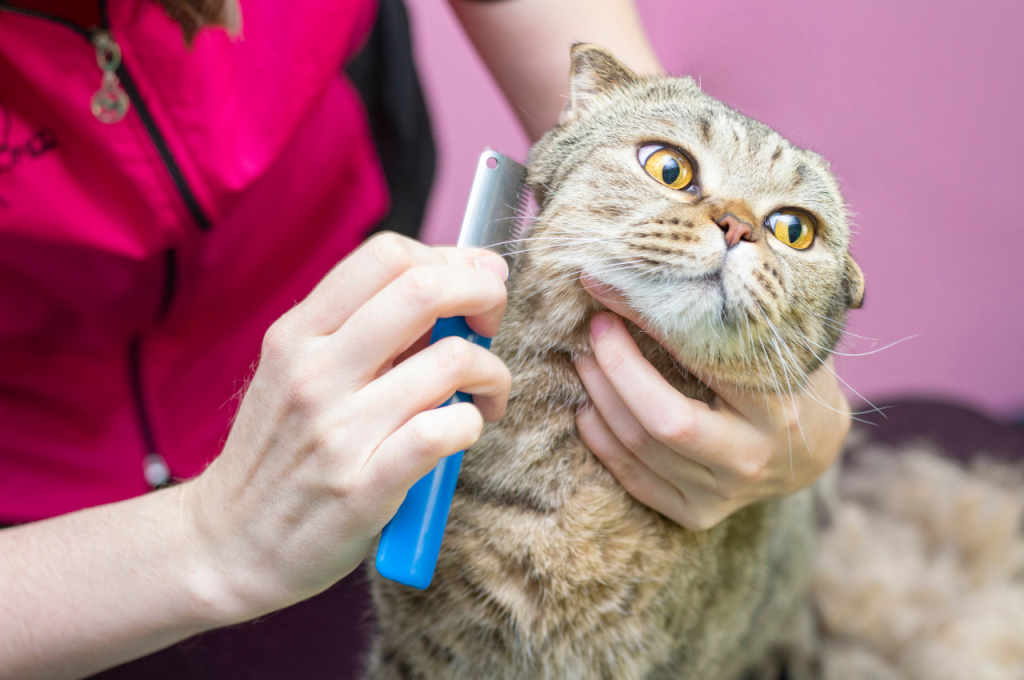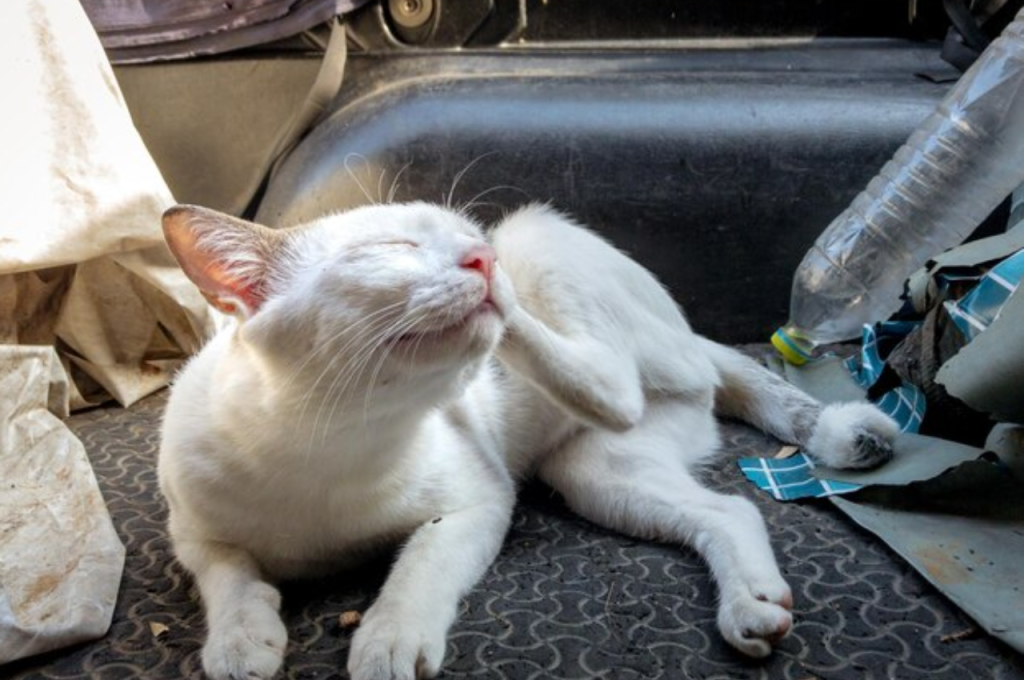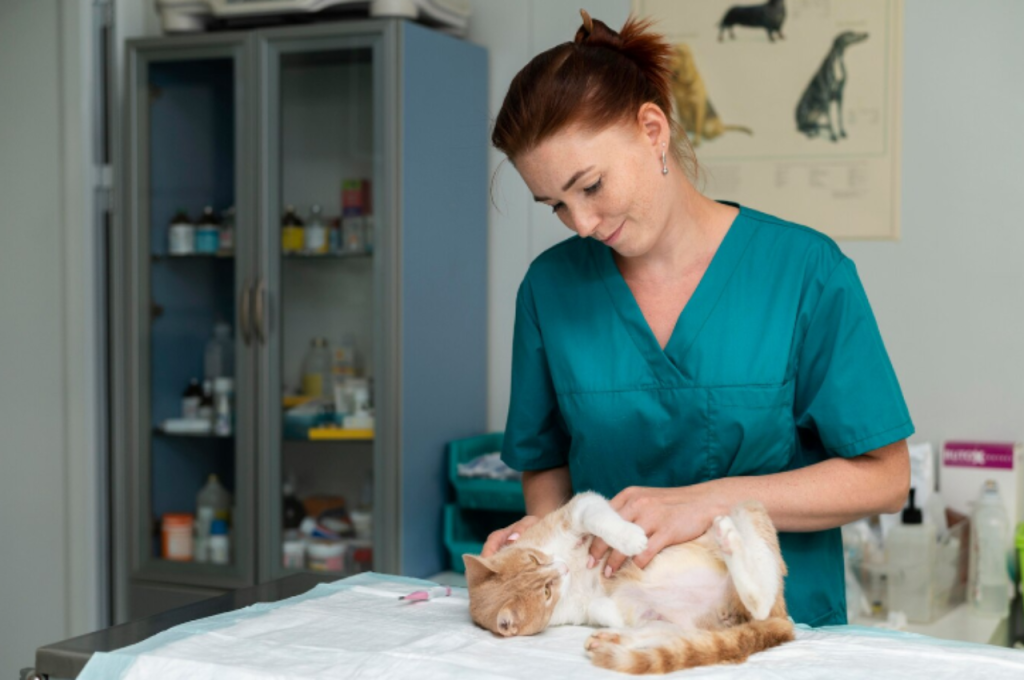If you don’t groom your cat, it can lead to various issues, such as matting, skin problems, and a higher risk of parasites. Neglecting grooming can result in discomfort and potential health issues for your feline friend.
Regular grooming helps maintain their coat’s cleanliness, prevents tangles, removes loose hair, and promotes good overall hygiene. It also allows you to check for any abnormalities or signs of illness. In addition, grooming sessions provide an opportunity for bonding and strengthening your relationship with your cat. By taking the time to groom your cat regularly, you can ensure their well-being and keep them happy and healthy.
Introduction to Cat Grooming
Grooming is an essential aspect of cat care that is often overlooked. Without regular grooming, your feline friend can experience a range of issues that affect their health and overall well-being. In this article, we’ll explore the importance of regular grooming for cats and the natural grooming habits they exhibit.

Importance of Regular Grooming
Regular grooming is vital for maintaining your cat’s overall health and hygiene. It helps to prevent matting, reduce shedding, and minimize the risk of skin infections. Grooming also allows you to check for any abnormalities such as lumps, bumps, or parasites, enabling early detection of potential health issues.
Natural Grooming Habits of Cats
Cats are meticulous groomers by nature. Their rough tongues act as natural brushes, effectively removing loose fur, dirt, and debris from their coats. Additionally, cats use grooming as a way to regulate body temperature, distribute natural oils, and stimulate blood circulation. Understanding their natural grooming behavior can help you support and enhance their grooming routine.
Matting: More Than a Hair Problem
Grooming your cat is essential for its overall well-being. Matting is more than just a hair problem; it can lead to various health issues and discomfort for your feline friend.
Consequences of Matted Fur
When left ungroomed, your cat’s fur can become matted, resulting in painful clumps and tangles. This can lead to skin irritation, infections, and discomfort for the cat. Additionally, matted fur can restrict movement and cause your cat to become less active.
Preventing Mat Formation
Regular grooming, including brushing and combing, is crucial to prevent the formation of mats in your cat’s fur. It helps in removing loose hair and preventing tangles, keeping your cat’s coat healthy and free from mats.
Skin Issues From Neglected Coats
Neglecting to groom your cat can lead to a range of skin issues, such as matting, which pulls on the skin and causes pain or irritation. Mats can trap dirt, oils, and debris, leading to skin infections and hot spots. A neglected coat may also harbor parasites like fleas and ticks, which can exacerbate skin problems and discomfort. Without regular grooming, your cat’s skin may become dry, flaky, and prone to irritation. Regular brushing and grooming help maintain a healthy coat, prevent painful mats, and reduce the risk of skin infections, ensuring your cat stays comfortable and healthy.
Identifying Skin Problems
If your cat’s coat is not properly groomed, it can lead to a variety of skin problems. Identifying these issues early is crucial to preventing further discomfort for your feline friend. Common symptoms of skin problems in cats include excessive scratching, hair loss, redness, and the presence of scabs or sores.
Link Between Coat and Skin Health
The health of your cat’s coat is closely linked to the overall condition of their skin. Neglected coats can become tangled and matted, leading to skin irritation and potential infections. Proper grooming is essential for maintaining a healthy coat and preventing skin issues in cats. Regular brushing and grooming help to distribute natural oils, improve circulation, and remove dead skin cells, promoting healthy skin and coat.
Parasite Infestations
Neglecting your cat’s grooming can lead to parasite infestations, causing discomfort and health issues. Regular grooming helps prevent fleas, ticks, and mites from taking over your cat’s fur and skin.
Common Parasites in Cats
Cats are prone to parasite infestations, and without regular grooming, the risk of infestation increases significantly. There are several common parasites that can affect your cat’s health, including fleas, ticks, ear mites, and intestinal worms. These parasites can cause a range of health problems, from mild irritation to life-threatening illness.
Effect of Grooming on Parasite Control
Regular grooming is essential for controlling parasites in cats. Grooming helps to remove fleas, ticks, and other parasites from your cat’s coat before they have a chance to infest your home. It also allows you to check for signs of infestation, such as flea dirt or ticks attached to the skin.
Grooming also helps to prevent the spread of parasites. Fleas, for example, can lay up to 50 eggs a day, which can quickly infest your home and other pets. By removing fleas and their eggs from your cat’s coat, you can prevent the spread of infestation to other pets and your home. Regular grooming also helps to prevent health problems associated with parasites. Fleas and ticks can transmit diseases, such as Lyme disease and Bartonella, to your cat. Intestinal worms can cause weight loss, diarrhea, and other health problems. By controlling parasites through regular grooming, you can help to keep your cat healthy and happy.
In conclusion, if you don’t groom your cat, you are putting them at risk of parasite infestation, which can cause a range of health problems. Regular grooming is essential for controlling parasites, preventing the spread of infestation, and keeping your cat healthy.
Psychological Effects of Poor Hygiene
Neglecting your cat’s grooming can lead to various psychological effects due to poor hygiene. Cats may become stressed, develop behavioral issues, and experience a decline in overall well-being if not properly groomed. Regular grooming is essential for your cat’s mental health and happiness.

Stress and Anxiety in Cats
- Cats experiencing poor hygiene can develop stress and anxiety.
- Dirty fur and skin issues can cause discomfort.
- Cats may feel overwhelmed and anxious.
Behavioral Signs of Neglect
- Increased hiding
- Aggression towards humans or other pets
- Excessive grooming or not grooming at all
- Loss of appetite and weight
Impact on Human Health
Neglecting to groom your cat can have a direct impact on human health. Cats that aren’t regularly groomed can develop matted fur, skin infections, and excess shedding, which may aggravate allergies in people.
Additionally, poor grooming can lead to a buildup of dirt, dander, and even parasites like fleas and ticks, which can easily transfer to humans, increasing the risk of skin irritations or infections. Regular grooming helps maintain your cat’s cleanliness, reduces allergens, and minimizes the chances of zoonotic diseases, creating a healthier environment for both you and your pet. By keeping up with grooming routines, you ensure that both you and your cat stay comfortable and healthy.
Allergies and Hygiene
Poor cat grooming can lead to increased allergies for humans.
- Frequent sneezing and itching
- Worsening asthma symptoms
- Exposure to dander and fur
Zoonotic Risks
Neglecting cat grooming can pose zoonotic risks to humans.
- Transmission of parasites like fleas and ticks
- Spread of diseases such as ringworm
- Increased risk of bacterial infections
Long-term Health Complications
Long-term health complications can arise if you don’t groom your cat regularly. Although cats are known for their hygiene, they still require grooming to maintain their overall health and well-being. Neglecting to groom your cat can lead to several chronic health issues, which can be costly to treat in the long run.
Chronic Health Issues
If you don’t groom your cat, it can lead to several chronic health issues, including:
- Matting: When your cat’s fur becomes tangled and matted, it can cause skin irritation, which can lead to infection.
- Parasites: Fleas, ticks, and mites can easily infest your cat’s fur if it is not groomed regularly, which can cause skin irritation and infections.
- Overgrown nails: If your cat’s nails are not trimmed regularly, they can grow too long and curl into their paw pads, causing discomfort and infection.
- Eye and ear infections: Dirt and debris can accumulate around your cat’s eyes and ears if not cleaned regularly, leading to infections.
The Cost of Neglect
Ignoring your cat’s grooming needs can end up being costly in the long run. If your cat develops any chronic health issues due to neglect, you may end up spending a considerable amount of money on vet bills, medications, and treatments. Moreover, it can cause your cat to be in discomfort, leading to a poor quality of life.
Therefore, it is essential to groom your cat regularly to avoid any long-term health complications, ensuring that your furry friend stays healthy and happy.
Grooming Tips for Cat Owners
Regular grooming is essential for cat owners to maintain their pet’s health and hygiene. Neglecting grooming can lead to fur matting, skin infections, and other health issues. Therefore, it is crucial to groom your cat regularly to ensure their overall well-being.
Cats are generally clean animals, but they need help from their owners to keep themselves well-groomed. Regular grooming is essential for your cat’s health and well-being. If you don’t groom your cat, it can lead to several problems, such as matting, hairballs, and skin infections. In this article, we’ll discuss the importance of grooming your cat and provide some grooming tips for cat owners.

Basic Grooming Techniques
There are several basic grooming techniques that you can use to keep your cat looking and feeling great. These techniques include:
- Brushing: Regular brushing helps to remove loose fur and prevents matting. Use a soft-bristled brush to groom your cat’s coat.
- Bathing: Cats don’t need to be bathed often, but if your cat gets into something dirty or smelly, a bath may be necessary. Use a cat-specific shampoo and warm water to bathe your cat.
- Nail Trimming: Trim your cat’s nails regularly to prevent them from getting too long and causing discomfort. Use cat-specific nail clippers and be careful not to cut them quickly.
- Ear Cleaning: Use a cotton ball and some cat-specific ear-cleaning solution to clean your cat’s ears. Be gentle and don’t insert anything into the ear canal.
Professional Grooming Services
While basic grooming techniques can be done at home, there are some grooming tasks that are best left to the professionals. These tasks include:
- Teeth Cleaning: Professional teeth cleaning can help prevent dental problems and keep your cat’s breath fresh.
- Haircut: If your cat has long hair that is prone to matting, a professional haircut can help keep their coat in good condition.
- Grooming for Senior Cats: Senior cats may require more specialized grooming, such as help with mobility, special shampoo for sensitive skin, or more frequent nail trimming.
In conclusion, grooming your cat is an essential part of pet ownership. Regular grooming can help prevent health problems, keep your cat looking and feeling great, and strengthen the bond between you and your furry friend. Use the basic grooming techniques mentioned in this article to keep your cat well-groomed at home, and consider professional grooming services for more specialized care.
Conclusion
Neglecting to groom your cat can have several negative consequences. Without regular grooming, your cat’s fur can become matted and prone to skin infections. Additionally, grooming helps to prevent hairballs and reduces shedding, keeping your home cleaner. Regular grooming also allows you to check for any abnormalities or health issues. Therefore, it is essential to prioritize grooming your cat to maintain their overall health and well-being.
